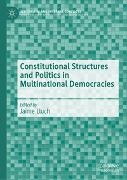Read more
Constitutional structures are an important mechanism for structuring the politics of multinational democracies, especially the political jousting between sub-state demoi and the state demos in plurinational polities. This book analyzes the interaction, which can be bi-directional, between constitutional structures and the trends and evolution of the heterogenous political orientations in substate national societies and majority nations in liberal democracies.
“Constitutional structures” refers to a wide variety of institutions and processes, and they create territorial regimes, which constitute distinctive models of state: unitarism, federalism, autonomism, regionalism, consociationalism, or even colonialism. Multinational democracies differ in the constitutional limitations and/or opportunities for accommodation of diversity offered by constitutional structures.
The authors in this collection utilize diverse methods and address these issues from different disciplinary perspectives. The book contains analyses of Québec-Canada, Catalonia-Spain, Puerto Rico-USA, Italy and its special regions, Scotland-United Kingdom, Bosnia and Herzegovina, Corsica-France, the Åland Islands-Finland, Mauritius, Fiji, and other cases.
Jaime Lluch is Professor of Political Science at the University of Puerto Rico. He has been awarded a National Science Foundation fellowship, a Ford Foundation Fellowship, and has held visiting fellowships at the European University Institute in Florence, Italy, the Collegio Carlo Alberto in Turin, Italy, the European Studies Centre at St Antony’s College, University of Oxford, UK, and the University of Pennsylvania. He is the author of Visions of Sovereignty: Nationalism and Accommodation in Multinational Democracies (2014).
List of contents
Chapter 1 Explaining the Weakening of Secessionism in Québec and the Resilience of Canadian Federalism.- Chapter 2 Subordinated Autonomism, Colonial Constitutionalism and Stateless Nationhood Puerto Rico in Comparative Perspective.- Chapter 3 Joel I. Colón Ríos and Tom Flynn, Professors of Law, University of Essex, UK. On Constitutional Structures.- Chapter 4 Multinational Conflict and Accommodation in Spain Challenges and Proposals.- Chapter 5From accommodation to competition Post-Brexit constitutional responses to Scottish self-government.- Chapter 6 Contrasting Visions on the Territorial Distribution of Power and Catalan independentism and the Constitutional Structures of the Spanish State of Autonomies.- Chapter 7 Constitutional Law and Politics in the Trump Era and The Future of Puerto Rico.- Chapter 8 The Constitutional Structures of Federation as a Compact among the Weak Comparative Perspectives.- Chapter 9Consociational constitutional structures between ethnocracy and democracy evaluating recognition of others.- Chapter 10Contemporary Corsica and French constitutional structures the hard road from integration to autonomy.- Chapter 11Is Federacy a Constitutionally Useful Category Reflections on the Constitutional Structures of Autonomism in the Åland Islands.- Chapter 12 The Laws of Empire and the Legal Structures of Domination Québec and Puerto Rico in Comparative Perspective.- Chapter 13Colonial Constitutional Structures The Judicial Imposition of Rights in Puerto Rico.- Chapter 14Constitutionalized Colonialism of the United States Versus Puerto Rico’s Right to Self-Determination.
About the author
Jaime Lluch is Professor of Political Science at the University of Puerto Rico. He has been awarded a National Science Foundation Fellowship, a Ford Foundation Fellowship, and has held visiting fellowships at the European University Institute in Florence, Italy, the Collegio Carlo Alberto in Turin, Italy, the European Studies Centre at St Antony’s College, University of Oxford, UK, and the University of Pennsylvania. He is the author of Visions of Sovereignty: Nationalism and Accommodation in Multinational Democracies (2014).
Summary
Constitutional structures are an important mechanism for structuring the politics of multinational democracies, especially the political jousting between sub-state demoi and the state demos in plurinational polities. This book analyzes the interaction, which can be bi-directional, between constitutional structures and the trends and evolution of the heterogenous political orientations in substate national societies and majority nations in liberal democracies.
“Constitutional structures” refers to a wide variety of institutions and processes, and they create territorial regimes, which constitute distinctive models of state: unitarism, federalism, autonomism, regionalism, consociationalism, or even colonialism. Multinational democracies differ in the constitutional limitations and/or opportunities for accommodation of diversity offered by constitutional structures.
The authors in this collection utilize diverse methods and address these issues from different disciplinary perspectives. The book contains analyses of Québec-Canada, Catalonia-Spain, Puerto Rico-USA, Italy and its special regions, Scotland-United Kingdom, Bosnia and Herzegovina, Corsica-France, the Åland Islands-Finland, Mauritius, Fiji, and other cases.

